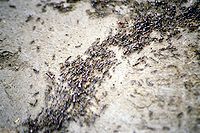
Resurrecting the Mysteries of Big Tau
Sign Up to like & getrecommendations! Published in 2020 at "Trends in Neurosciences"
DOI: 10.1016/j.tins.2020.04.007
Abstract: Tau, a microtubule-associated protein that modifies the dynamic properties and organization of microtubules in neurons and affects axonal transport, shows remarkable heterogeneity, with multiple isoforms (45-65 kDa) generated by alternative splicing. A high-molecular-weight (HMW) isoform… read more here.
Keywords: mysteries big; big tau; tau; resurrecting mysteries ... See more keywords

Big tau aggregation disrupts microtubule tyrosination and causes myocardial diastolic dysfunction: from discovery to therapy.
Sign Up to like & getrecommendations! Published in 2023 at "European heart journal"
DOI: 10.1093/eurheartj/ehad205
Abstract: BACKGROUND Amyloid plaques and neurofibrillary tangles, the molecular lesions that characterize Alzheimer's disease (AD) and other forms of dementia, are emerging as determinants of proteinopathies 'beyond the brain'. This study aims to establish tau's putative… read more here.
Keywords: tau; diastolic dysfunction; brain; therapy ... See more keywords

Big Tau: What We Know, and We Need to Know
Sign Up to like & getrecommendations! Published in 2023 at "eNeuro"
DOI: 10.1523/eneuro.0052-23.2023
Abstract: Visual Abstract Tau is a microtubule-associated protein (MAP) that has multiple isoforms generated by alternative splicing of the MAPT gene at a range of 45–60 kDa [low-molecular-weight (LMW) tau] as well as a unique isoform… read more here.
Keywords: tau; know need; tau know; need know ... See more keywords

Evolutionary perspective of Big tau structure: 4a exon variants of MAPT
Sign Up to like & getrecommendations! Published in 2022 at "Frontiers in Molecular Neuroscience"
DOI: 10.3389/fnmol.2022.1019999
Abstract: The MAPT gene encoding the microtubule-associated protein tau can generate multiple isoforms by alternative splicing giving rise to proteins which are differentially expressed in specific areas of the nervous system and at different developmental stages.… read more here.
Keywords: evolutionary perspective; structure; tau; exon variants ... See more keywords